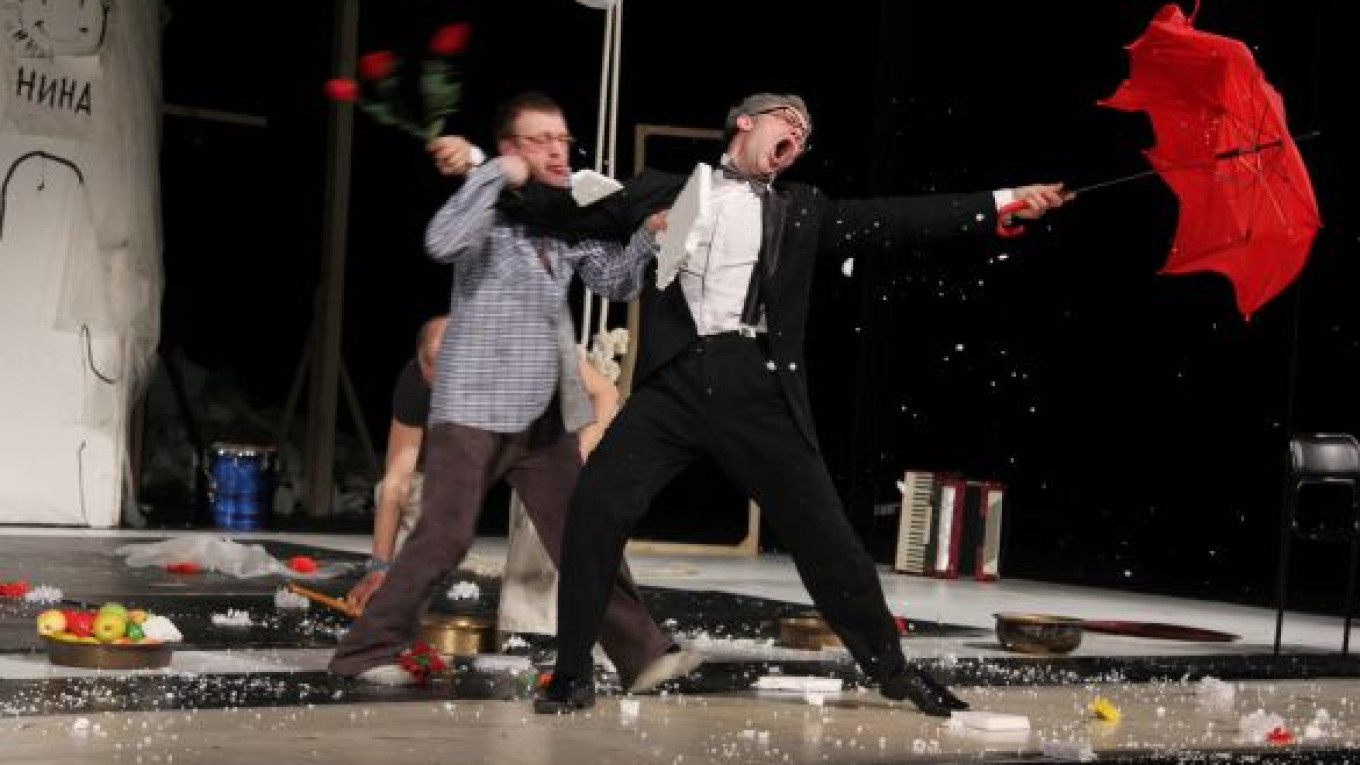Ah! It happened again! Still another theater season in Moscow ended. You’d think with theater as good as it is here we could find a way to make it last forever.
Well, if you do that, fax me. I’m at the beach.
In the meantime let’s take a look at what gave the 2010-11 season flavor and personality. I must say, I thought this was the best season of at least the last three or four. Here are my 19th annual Moscow Times theater awards to prove it.
Trend of the Year: New drama being interpreted creatively by directors. Ever since the new drama movement arose a decade ago, it has been considered imperative to stage new plays “as written,” with no directorial embellishment. That changed drastically this season. And for the better, I might add. I love theater with great directorial vision. That’s what we had in “The Field” at the Contemporary Play School, “I Am the Machine Gunner” at the SounDrama Studio, “I Don’t Believe” at the Stanislavsky Drama Theater and “Light My Fire” at Teatr.doc. Read on for details.
Best Design: “Alice Through the Looking Glass,” Fomenko Studio. Admit it! You’ve been waiting for this! When this gorgeous show premiered I said I’d eat my hat if I didn’t name it best design at year’s end. Well, there were many attractive, effective and intriguing sets throughout the year, but there was never any contest for this award. Designed by a team of six led by director Ivan Popovski, “Alice” wins hands down. One of the most beautiful and visually sophisticated shows I’ve ever seen in Moscow.
Best New Play: “The Schooling of Bento Bonchev” by Maksym Kurochkin at the Playwright and Director Center. Kurochkin is a chameleon. Every play he writes is unlike the last, yet each new work is mature and convincing. “Bento Bonchev” is a wildly ironic, very hip play about the demise of love and sex in the modern world. But while demonstrating that thesis on the surface, Kurochkin proves just the opposite on another level. Masterful, witty writing.
Classic Brief: Robert Sturua’s 90-minute version of Shakespeare’s “The Tempest” at the Et Cetera Theater. Beautiful, brisk and boldly inventive, this was one of the great Georgian director’s best shows in years.
Modern Classic: Yury Klavdiyev’s “I Am the Machine Gunner” at the SounDrama Studio. Vladimir Pankov grabbed this simple, moving play about a gang member having second thoughts, and transformed it into a phantasmagoria that pilloried George W. Bush, Barack Obama, Dmitry Medvedev, Vladimir Putin and anyone else who would send human beings into harm’s way.
Broadway Meets the Garden Ring: Yury Yeryomin’s “Casting,” a free adaptation of “A Chorus Line” at the Mossoviet Theater. Starring the inspiring Alla Sigalova as a famous choreographer staging her latest show in the provinces, “Casting” completely Russianizes the original story, giving the characters local backgrounds, problems and viewpoints. It is as sharp as a tack, and Sigalova is as breathtaking as the fleet-footed, slyly manipulative choreographer.
True Blood: Dmitry Krymov’s luminescent, funny and grisly “Katya, Sonya, Polya, Galya, Vera, Olya, Tanya,” an adaptation of stories by Ivan Bunin for the School of Dramatic Art and the Meyerhold Center. The lyrical Bunin got a tough-love reading from Krymov, who created warm, affectionate portraits of women who are skewered, asphyxiated and otherwise disembodied by their insensitive men.
Eccentricity Plus: Pavel Pryazhko’s “The Field” at the Contemporary Play School. This funky play about the consequences of Belarussian farmers unknowingly plowing across the European border received a marvelously obtuse, futuristic staging from director Filipp Grigoryan.
Push Comes to Shove: Backstage jostling was nastier than ever this year, with managing directors and artistic directors involved in scandals at numerous theaters, including the Mayakovsky, the Stanislavsky and the School of Dramatic Art. There’s only one Big Kahuna in this town, though — Yury Lyubimov, the reigning champion of all who would monger scandals. Lyubimov resigned from his Taganka Theater thrice this year, the last time coming after a confrontation with his actors in the Czech Republic in June. By all appearances, the third time was the charm. Lyubimov is gone. The Taganka lives on without him.
New Kid on the Block: Yelena Gorina, the actress in Yaroslava Pulinovich’s “Natasha’s Dream” at the Meyerhold Center. Sublime as an orphan girl whose life falls apart before her eyes, she was immediately tabbed by Eimuntas Nekrosius for a part in his high-profile production of “Caligula.”
Hanging on a Limb: Marat Gatsalov’s production of Mikhail Durnenkov’s “I Don’t Believe” at the Stanislavsky Theater. This attempt to stage something based loosely on Konstantin Stanislavsky’s famous memoir, “My Life in Art,” was as risky as they come. It was weird, quirky and unwieldy. And by the end, it reached some spectacular heights exploring what it’s like to doubt and believe in yourself while your life hangs in the balance.
Gone Over the Edge: Ivan Vyrypayev’s “Comedy” at Praktika. Vyrypayev, a master of monologue and dialogue, set out to mine depths of meaning in a spoof of contemporary Russian stand-up comedy. Instead of the writer infusing the genre with more, the genre made his work look like less.
The Bigger They Are: Konstantin Raikin in Valery Fokin’s “Konstantin Raikin: An Evening With Dostoevsky” at the Satirikon Theater. Raikin, my choice for Russia’s finest actor, easily held his ground in this brilliant one-man show based on Dostoevsky’s “Notes from the Underground.”
The Harder They Fall: Eimuntas Nekrosius’ production of Albert Camus’ “Caligula” for the Theater of Nations. It’s sad to admit, but it’s true: The greater they are, the more painfully they flop. Nekrosius is one of the great directors of our time. I have no idea what he was doing with this show. It was long, monotonous, lethargic and utterly out of touch. In an age when evil, corrupt dictators are popping up out of the woodwork everywhere, this production suggested that evil, corrupt dictators are just nice guys caught in a squeeze. Say what?
Blessed (though Doomed) Are the Meek: Maria Berdinskikh in Vladimir Mirzoyev’s production of Witold Gombrowicz’s “Princess Iwona” at the Vakhtangov Theater. In the almost wordless title role, Berdinskikh dominated this fascinating production about the deadly battle that arises when absolute corruption slams up against utter innocence.
Perfect Match: Kama Ginkas and Alexei Devotchenko, who teamed up to create the divinely acerbic “Diary of a Madman” at the Theater Yunogo Zritelya. This tale by Nikolai Gogol about a man sinking into insanity was recalibrated by director and actor as an unblinking assault on politics, pop culture and, yes, theater’s place between those two. Bull’s eye.
Breakthrough, or, as Jim Morrison and the Doors sang it, “Break on through to the other side”: That would be Sasha Denisova’s “Light My Fire,” directed by Yury Muravitsky at Teatr.doc. This may be the best thing ever to come out of the nine-year-old Teatr.doc. It takes the documentary style that the theater made famous and layers on actors’ and director’s finesse to tell a humorous, skewed version of the stories of rockers Morrison, Janis Joplin and Jimi Hendrix. In Denisova’s version, these characters are Russians or Uzbeks who grew up in Vologda or other Russian locales. While exploring the experiences of famous American misfits, it reveals the aspirations and experiences of their spiritual kin in Russia. Scintillating.
Best Actor: Alexei Devotchenko. See “Perfect Match” — ’nuff said.
Best Actress: Alla Sigalova. See “Broadway Meets the Garden Ring.” Brava!
Best Production: Yury Butusov’s “The Seagull” at the Satirikon. I don’t know where to start to tell you how powerful this was. It was like getting to see behind the curtain in Oz, but finding out that everything there really is magic. Butusov blew out all the stops in Chekhov’s play and gave us an exhilarating look at what art is and artists do.
Man of the Year: Georg Genoux. According to that inimitable thespian Bob Dylan, “We live in a political world.” You wouldn’t always know that by Moscow theater. A few venues will give you politics, but Genoux, the founder of the Joseph Beuys Theater, ups the ante. First of all, Genoux’s theater this year moved into the Andrei Sakharov Museum. That’s saying something already. More important is what Genoux does. His productions of “The Burden of Silence” and “Anne and Helga” make old politics meaningful today. And with events such as the staged reading of the correspondence between writer Lyudmila Ulitskaya and jailed oil tycoon Mikhail Khodorkovsky, Genoux ensures that contemporary politics continue to put teeth into Moscow theater.
A Message from The Moscow Times:
Dear readers,
We are facing unprecedented challenges. Russia's Prosecutor General's Office has designated The Moscow Times as an "undesirable" organization, criminalizing our work and putting our staff at risk of prosecution. This follows our earlier unjust labeling as a "foreign agent."
These actions are direct attempts to silence independent journalism in Russia. The authorities claim our work "discredits the decisions of the Russian leadership." We see things differently: we strive to provide accurate, unbiased reporting on Russia.
We, the journalists of The Moscow Times, refuse to be silenced. But to continue our work, we need your help.
Your support, no matter how small, makes a world of difference. If you can, please support us monthly starting from just $2. It's quick to set up, and every contribution makes a significant impact.
By supporting The Moscow Times, you're defending open, independent journalism in the face of repression. Thank you for standing with us.
Remind me later.







